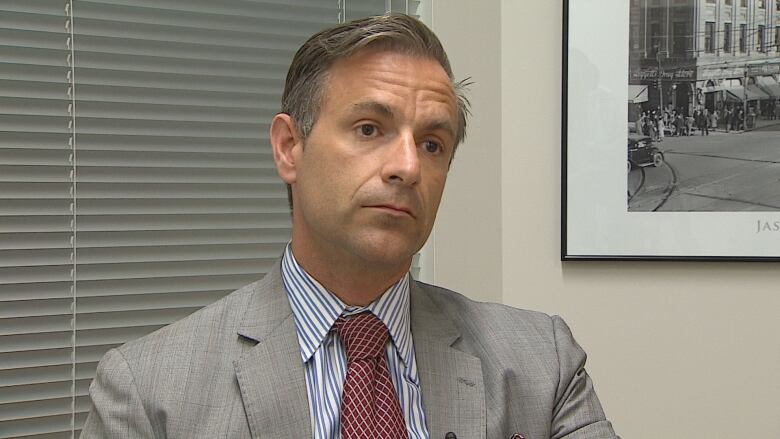A tax on share buybacks will hit the oil and gas sector. Was that the whole point? | CBC News

This week Ottawa announced its plans to introduce a tax on share buybacks, at a time when oil and gas companies have yet again reported windfall profits and additional share buybacks.
Buybacks are when publicly traded companies buy back a portion of their own shares on the stock market, at market prices. They are a way to reward existing investors, but also tie up cash that could be used to grow a business — or, in the case of oil and gas companies, pay for climate mitigation measures.
Cenovus, which launched a share-buyback program in November 2021, has since bought around 118 million common shares and delivered about $2.5 billion in returns to shareholders. The company’s share buyback program is about to expire; it plans to apply for another one.
Canadian Natural Resources has returned about $5.1 billion to investors so far this year in share repurchases, up from approximately $940 million it spent on repurchases by this time last year.
Suncor has repurchased approximately $4.6 billion of its common shares this year, up from $1.7 billion by the end of September last year.
And ConocoPhillips has repurchased $6.5 billion of shares this year, up from $2.2 billion by this time last year, and has raised its existing share repurchase authorization by $20 billion.
With the new two per cent tax announced for 2024, Ottawa expects to bring in $2.1 billion over five years, and encourage companies to reinvest their profits in their workers and businesses.
But is the oilpatch being directly targeted by this tax, or does it just happen to be among the industries most affected — if not the industry most affected — by something the government would have done regardless?
A target or a coincidence?
Just days before the tax was introduced, Environment Minister Steven Guilbeault posted a video on Twitter criticizing the sector for how it’s spending record-breaking profits.
Oil and gas companies are making record profits. <br><br>It’s time for them to make record investments in clean energy and reducing pollution. <a href=”https://t.co/km14XbZ3ST”>pic.twitter.com/km14XbZ3ST</a>
—@s_guilbeault
“As Canadians see those profits, we need to see investment into cleaner energy, instead of share buybacks,” he said.
“Dollars must start flowing,” the minister said, into the plans energy companies have already announced for reducing emissions.
That follows a report earlier this fall from the Pembina Institute, criticizing the sector for spending too much on dividend payments and share repurchases, and not enough on decarbonization. (The Pathways Alliance, a group of large oil companies who’ve pledged their own net-zero targets, has disputed this characterization.)
“I think this is a recognition that we’re not seeing these companies invest their record profits in reducing emissions, which is what needs to happen,” said Jan Gorski, program director for oil and gas at the Pembina Institute.

But Martin Pelletier, a Calgary-based senior portfolio manager with Wellington-Altus Private Counsel, isn’t so sure. He said the government likely had its eye on the oil and gas sector given how well it’s doing, but believes its aim was more so to emulate a U.S. policy that could generate some extra government revenue, rather than to send a particular message.
“Tying it to the environmental side, that’s a stretch in my opinion,” said Pelletier.

Duncan Kenyon, with the group Investors for Paris Compliance, sees it the same way: a tax inspired in part by the oil and gas industry’s windfall profits — but not necessarily targeted at that industry, especially since it won’t take effect until 2024.
“If you wanted to really send a strong signal to a specific sector on their investment needs, this isn’t the way to do it,” he said.
Buybacks don’t improve or expand a company’s underlying business, but they have the effect of driving up share prices and improving various profitability metrics by reducing the amount of shares in the company, which investors tend to welcome.
The tax is expected to come into effect in January 2024. Further details have been promised in Budget 2023.
When asked in a news conference about the energy sector’s windfall profits and whether a windfall tax would have been appropriate, Deputy Prime Minister Chrystia Freeland pointed to the new tax on share buybacks as the “appropriate additional tax measure,” though she didn’t comment on any particular industry’s profits.
In a statement to CBC News, a spokesperson for her office emphasized the tax would apply to “all types of share buybacks by public corporations of all sectors.”
What difference will it make?
Whether or not the tax was directed at the oilpatch in particular, it remains to be seen how much of an impact it will have on the sector.
The Canadian Association of Petroleum Producers has said it’s concerned the two per cent tax on share buybacks, which is double the rate being considered in the U.S., could discourage investment in Canadian-run businesses and put Canadian shareholders’ returns at risk.
For his part, Pelletier described the tax as “not material” and said companies may find other ways of deploying their excess cash, such as by boosting dividends and paying down more debt.

Kenyon expects a similar outcome.
“They will look for mechanisms to return capital to investors when there’s this kind of cash flow and they will find other ways to do it,” he said, adding that other aspects of the fiscal update, such as proposed incentives for clean technology and the confirmation of a tax credit for carbon capture, utilization and storage, are more likely to spur investment.
For his part, Gorski remains hopeful the tax will not only prod companies into redirecting some of their cash into investment, but investment in reducing emissions, in particular.
“I think it’s a good start, and as we go forward we need to continue to evaluate how companies are spending that money,” he said.
[ad_2]
Share this news on your Fb,Twitter and Whatsapp
NY Press News:Latest News Headlines
NY Press News||Health||New York||USA News||Technology||World News





